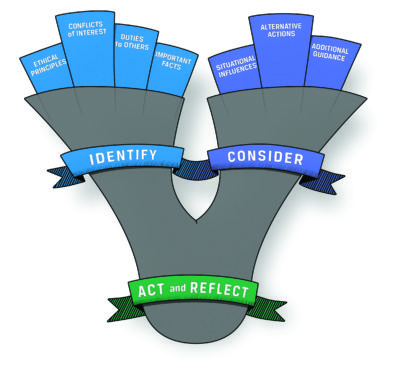Ethics in Practice: Using Info for Fund and Personal Accounts OK? Case and Analysis
How did you do analyzing this week’s (18 June) case? Check out the analysis below.
In this week’s case, a hedge fund owner makes some investment decisions after a company fails to honor payment for its commercial paper. Consider the situation through the lens of the CFA Institute Code of Ethics and Standards of Professional Conduct (Code and Standards) and then join the conversation to share your views and see what others think.
Case
Eaton runs a hedge fund that holds the commercial paper (CP) of a listed company. The fund also has a large investment in the equities of that company. Upon maturity of the CP, the company fails to honor the CP and refuses to communicate with Eaton. Based on these facts combined with further research indicating that the company may be having liquidity issues, Eaton sells the fund’s equity position. Eaton also shorts the company’s stock in his personal account. Select one of the following answers and then join the conversation to explain your choice.
- Eaton violated the Code and Standards by selling the fund’s equity position in the company.
- Eaton violated the Code and Standards by shorting the company’s stock in his personal account.
- Eaton violated the Code and Standards by both selling the fund’s equity position in the company and shorting the company’s stock in his personal account.
- Eaton did not violate the Code and Standards.
Analysis
This case involves CFA Insitute Standard II(A): Material Nonpublic Information, which prohibits trading or causing others to trade on material nonpublic information. Information is considered “material” if it is likely to affect the price of a security. It is considered “nonpublic” if is not widely disseminated. But under the mosaic theory, those who work to uncover and piece together nonmaterial and/or public information to form an opinion about a security can trade based on significant conclusions derived from that analysis. In this case, the fact that a company has defaulted on its commercial paper commitment would likely be a material fact that a reasonable investor would like to know. It is also likely that information regarding the default, at least initially, is not publicly known. The CP is privately traded, and this information may be available only to the holders of the CP.
Eaton becomes aware of the default because his hedge fund owns the CP, and thus he becomes immediately aware of the default when it occurs. The fund is in a unique position to be the first to be aware of the cash flow problems of the company. Does the fund have to wait to trade on the information until it becomes publicly known? This situation is similar to the case in which a customer orders goods from a manufacturer who does not deliver on time. The customer is in the best position to know that the manufacturer defaulted on the contract and thus have an early understanding of the difficulties the company is having. The informational advantage arises from a learned fact as a result of the proximity to the company, not because of any inside information. Intrepid analysts are likely to discover the information eventually. Eaton’s hedge fund is the first to do so given their relationship with the company. But even if Eaton’s hedge fund is able to trade on the information, Eaton’s investment action for his personal account is likely in violation of the standards because he is taking inside information that is confidential to the hedge fund and using for personal gain. The best choice in this case is B.
This case was submitted to CFA Institute by an “Ethics in Practice” participant.
Have an idea for a case for us to feature? Send it to us at [email protected].
More About the Ethics in Practice Series
Just as you need to practice to become proficient at playing a musical instrument, public speaking, or playing a sport, practicing assessing and analyzing situations and making ethical decisions develops your ethical decision-making skills. The Ethics in Practice series gives you an opportunity to “exercise” your ethical decision-making skills. Each week, we post a short vignette, drawn from real-world circumstances, regulatory cases, and CFA Institute Professional Conduct investigations, along with possible responses/actions. We then encourage you to assess the case using the CFA Institute Ethical Decision-Making Framework and through the lens of the CFA Institute Code of Ethics and Standards of Professional Conduct. Then join the conversation and let us know which of the choices you believe is the right one and explain why. Later in the week, we will post an analysis of the case and you can see how your response compares.
Image Credit: ©CFA Institute

